- Home
- Jess Walter
(2004) Citizen Vince Page 6
(2004) Citizen Vince Read online
Page 6
“Actually”—Vince steps in behind her—“I want something on politics. You got anything like that?”
She doesn’t turn to face him. “Oh, a political novel. Excellent. Perhaps Robert Penn Warren?”
“I was thinking nonfiction.”
This stops Margaret short. She turns. “But your girl said she likes novels.”
“It turns out she’s working for this guy’s campaign and I thought—”
“A campaign?” Margaret brightens. “Your girl is an activist? Well. A girl with a social conscience. Excellent, Mr. Camden. This girl sounds substantial.”
“She’s pretty tall.”
Margaret misses his joke as she moves down to the nonfiction stacks.
“Perhaps something on governmental theory? Electoral politics? Maybe straight reportage? Essays?”
“What do you have on presidential elections?”
“Ah, yes. Timely. Easy to talk about. Perfect entrée to a meaningful discussion. Very good, Mr. Camden. Very sly.” Margaret is not quite five feet tall and she slides a stool along as she moves through tall, narrow stacks of essays and biography. He follows her and she hands him books: Fear and Loathing on the Campaign Trail 1972 and The Making of the President 1960 and The Selling of the President 1968.
Vince looks at the books. “Which one of these will tell me who to vote for?”
Again she misses the joke, is concentrating and doesn’t answer, just keeps handing him books. Vince considers her, dangling from the stepladder.
“Margaret, are you busy tonight?” When there is no answer he continues. “I’m going to hear Reagan’s son tonight. Do you have any interest in going to that?”
She stops and turns, comes down the steps, and hands him Arthur Schlesinger’s massive A Thousand Days. Then she smiles sweetly. “Reagan? Oh, God no, Mr. Camden. Those Republican snakes scare the goddamned wind right out of me.”
ABOUT THE MAILMAN: his name is Clay Gainer. Forty-eight, black, tall and wiry, from Lamar, Texas, face framed with graying sideburns. The son of sharecroppers and the first of his family to get out of Lamar, Clay got married at sixteen, joined the military, and ended up at Fairchild Air Force Base in Spokane, where he settled, retired, and started a second career with the post office. Vince met him at the donut shop and, after getting to know him for a few weeks, explained how it could work—Clay keeping an eye out for new credit cards going out to people, then yanking them out of his bag, giving them to Vince, who pays twenty bucks a card, unseals the envelopes, writes down the card number and name, seals them back up, and gives them back to Clay to deliver. He ran a similar operation back in the world, so he knew which cards to steal. At first Clay wanted nothing to do with it, but Vince noticed that he kept asking questions and Vince explained it slowly and clearly, how they weren’t stealing from people, they were stealing from banks. How, if they did it right, the banks would assume the numbers were being stolen by people after they’d been delivered, when they were used in restaurants or stores. Clay started slowly, a credit card from a jerk on his route, then from a guy who refused to shovel snow from the sidewalk. And then they moved Clay to a central processing office and he had access to all that mail, all those new credit cards going out to all those people. And bang, they were in business.
“You being careful?” Vince asks the mailman.
“Just like you said.”
“Tell me.”
“Ah, Vince.”
“Tell me.”
Sighs and recites: “Only steal from national banks. Never take more than two pieces per zip. Never take more than five pieces a week. Never take from the same zip in the same week. Look for cards going back in the mail. If I think anyone’s watching me, stop for a month.”
“You been talking to someone at the post office?”
“No. ’Course not.”
“Talking to anyone?”
“What do you think, I want to go to jail?”
Certain as he was yesterday that everyone was conspiring against him, Vince can see today that Clay is telling the truth. And of all the people in Vince’s small enterprise—Clay, Len, and Doug—Clay is the only vital one. Maybe everything is okay.
They sit bundled up at an outdoor picnic table at a drive-up burger restaurant called Dicks, each holding a Whammy—two gray hamburger patties, a shingle of cheese, a pickle, and a circle of onion. A flock of tiny french-fry birds scavenges the parking lot and the picnic tables, but at three P.M. Vince and Clay are the only people eating. The birds are impatient.
Vince slides the note across the table. “Okay,” he says, “then what’s this about? Why’d you need to see me?”
Clay slides a brochure across the table. Vince stares at him for a minute and finally looks down. The brochure shows a 1981 Nissan 300ZX. Personally, Vince doesn’t think much of Japanese sports cars.
“I’ve always wanted one,” Clay says. “And this guy will take the Caprice on trade. I’ll only have to come up with—”
“Come on, Clay. I told you a hundred times. We can’t go flashing money around.”
“But, Vince. I really want this car.”
“You can afford this?”
“Not yet. But I was hoping you could pay me a little more. I know you got it, Vince. Maybe you could give me an advance on the cards I’m going to steal, or give me a little bigger percentage.”
Vince rubs his temple. “You know something like that draws attention. Are the other guys at the post office driving new sports cars?”
“I could say I inherited some money. Or an insurance settlement.”
“Clay, there’ll be plenty of time for—”
“Please, Vince.”
“Let’s talk about something else. Who are you gonna vote for?”
“I wouldn’t even drive it to work. I can walk to work most days.”
“Carter or Reagan?”
“I’ll only drive it on the weekends.”
“’Cause if you’re not doing anything tonight, I’m going to hear Reagan’s son.”
“Vince. Listen to me. It’s not like a Ferrari or a Porsche.”
“Clay. It’s not a good idea.”
“Please, Vince. Just this one thing. I mean, what’s the point? What good is all this money we’re making if we don’t ever get to spend it?”
Another thing about Clay: his wife died two years ago. An aneurysm. Sudden thing. She got up to make Clay’s breakfast and he found her slumped like empty clothes in a corner of the kitchen, still holding an egg in her hand. That’s why Clay started coming into the donut shop every morning, and how Vince got talking to him in the first place. There was something about him that Vince identified with, like he knew some better part of his life was over.
Vince stares out toward downtown. After a moment, he slides the brochure back across the table. “Look, Clay, it’s just not the right time. Give it a month or two, and then we’ll talk again. Okay?”
Clay doesn’t say anything, just takes his brochure back and, in the process, knocks a few french fries onto the ground. They’ve barely hit before the birds are at Clay’s feet fighting over them.
REAGAN’S KID LOOKS like a bookkeeper approaching middle age, just this side of respectability, even in coat and tie. He is at the podium at the front of this restaurant lounge, maybe eighty people at tables around the room, like they’re waiting for a nightclub act—a comic, or some Sinatra impersonator. And that’s what Reagan’s kid gives them, an act. Vince imagines that this guy has been doing this for weeks, flying around to minor campaign stops like Spokane, Washington, and giving the hard conservative sell while his father tries looking moderate on TV. It’s clear he’s been sent out to rally the troops for his old man.
…time we took our country back from the liberal, permissive anti-American forces that have taken over. It’s time we returned to the position of world leader. It’s time we had a man in the White House who can stand up to the Communists and the socialists and the abortionists and the rapists and the Ayatollah
Khomeini. It is time!
The room breaks into applause, whistles, and cheers. Vince looks around at eager white faces. In the opposite corner, beautiful blond Kelly is sitting next to a youngish guy with short hair, square jaw, and bushy sideburns—a man in full compromise with himself—that Vince guesses must be Aaron Grebbe, the candidate for legislature she talked about. They’re not holding hands or anything, and Vince can’t tell if there’s anything between them. When Grebbe claps, Vince notices a big band on his ring finger. Kelly meets Vince’s eyes and frowns, as if Michael Reagan is not quite what she expected. Then she looks at the woman on Vince’s left and raises her eyebrows, as if to say, Way to go, Vince. She’s pretty.
Vince glances over at Beth, who is smiling, and who has been smiling since Vince tracked her down at her apartment, and offered to pay her to come hear Reagan’s kid with him. And she does look pretty, in a tight baby blue dress—her real estate dress—open at the top, with big, lacy sleeves, one of which covers most of her cast. Her wrap rests on the back of her chair.
…pride in America. Pride in our products and our armed services and our farmers and our factory workers. Pride in our God. And we are equally bonded in our disdain for the appeasers and apologists, the radical environmentalists and atheists…
In between his enthusiastic bursts of applause, Grebbe leans over and whispers something to Kelly, who nods curtly. Kelly is wearing a red sweater and a sheer black skirt, and when she crosses her legs Vince can see the muscles in her thighs through the material and he wonders if anyone hears the slight whimper he makes.
…coddling and catering to criminals of all stripe, the triumph of fear in our cities. Well, let me tell you something: to the rapists and forgers, to the hippies and the socialists and pornographers, to those who hate this country, your days are numbered. You, who live off the goodwill of the rest of us, who siphon this country’s promise, who subvert the very idea of America, who…
Grebbe puts his hand at his side and Vince notices that Kelly puts her arm to her side, and while he can’t see it, he can imagine their hands finding each other, squeezing. After a second, Grebbe leans over and whispers again. Kelly shakes her head, pulls her hand away, and frowns again.
…pinko college professors and student agitators, the liberal establishment and their media lapdogs, corrupt union leaders and professional protesters, druggies and commies and hippies and streakers and welfare mothers and hookers and thieves and fetus murderers and…
Evergodambody. Vince feels a hand on his own, and when he looks down he sees that the hand is connected to Beth’s unbroken arm. He knows she hates holding hands. He looks up at her small, triangular face: the picture of calm, her neck long and slender, her chin high, taking all of this in, a soft smile at the corners of her mouth, her cast in her lap, her other hand in Vince’s lap, squeezing his fingers.
“YOU KNOW WHAT freaked me out?” Beth asks as they wait in line. “How Jimmy Carter said he had lust in his heart. You know? In Playboy? I never thought of a president like that before. You know…horny?”
“I’m sure they all get like that,” Vince says.
“I suppose,” Beth says. She seems disappointed.
They edge forward in line to see Michael Reagan. Up close, he’s younger than he looked on stage.
“Thanks for coming down,” Michael Reagan says in a slightly condescending rasp. “I hope my dad can count on your support.”
Vince extends his hand. “You think he’s gonna bomb Iran?”
Reagan’s kid pumps Vince’s hand. “I’ll tell you what. The extremists in Iran are shaking in their boots at the thought of a Reagan presidency, just like the liberals in this country. I promise you that, sir. Thanks for coming.” And he pushes Vince along with his free hand and extends his hand for Beth’s, but Vince isn’t done.
“So what does that mean? Is your old man gonna send in the Marines?”
“I can tell you that Ronald Reagan’s America will be a nation that acts with forethought and resolve, and sometimes with might. Thanks for your support.”
Vince just stares at him. “But what does that mean?” Before he can get another answer, someone has taken Vince by the elbow and pushed him through the line.
Meantime, Michael Reagan is looking for more help as he stares at a thin woman in a blue dress offering her cast and a pen. “Can you sign this?”
OUTSIDE ON THE sidewalk, a handful of lesser local Republican candidates—five white men in their late thirties and forties—are blowing in their cold hands, bouncing on the balls of their feet, handing out buttons and brochures to the people leaving Michael Reagan’s speech. Vince takes a Grebbe pin. Aaron Grebbe is 1980’s idea of handsome, an ascension of squares—square shoulders and square jaw, short hair squared around an honest square face, a news anchor’s face, just the kind of guy he’d expect Kelly to be involved with, except for the wedding band on his left hand, the only round thing on the man. He wears shiny new cowboy boots; this is the only city Vince has ever known where lawyers and politicians wear cowboy boots with their suits.
Kelly stands a few feet from him, her hands crossed in front of her. “Aaron, this is Vince Camden, from the donut shop, the guy I told you about who reads everything.”
The guy who reads everything. Vince covers his smile. “It’s nice to meet you.”
Grebbe’s handshake is fast and firm, all business. “Good to meet you. I trust I can count on your support Tuesday.” When they drop their handshake, Grebbe’s right hand goes straight to his wedding ring. He spins it on his finger as if he’s desperately trying to unscrew it.
“Vince was reading The World According to Garp a few months ago.” Kelly touches Grebbe’s arm. “That’s Aaron’s favorite book.”
“What did you think of it?” Grebbe asks. He shifts his weight from one cowboy boot to the other.
“I liked the beginning,” Vince says.
Kelly looks from Vince to Beth, who is standing behind his left shoulder.
“Oh, sorry,” Vince says, stepping out of the way. “This is my friend Beth.”
“Real estate,” Beth blurts, as if she’s been repeating it over and over in her head, waiting for her opportunity.
Kelly and Grebbe stare at her.
“Beth’s in real estate,” Vince explains.
Her face flushes. “I’m studying for my license.”
They all shift their weight and agree that it’s wonderful. Beth seems sickly standing next to the tall, blond Kelly. “I love your hair,” Beth says to Kelly—almost a whisper, an apology.
“Oh, aren’t you sweet.” Kelly’s head drops and she smiles like a person would smile at a sick puppy or a little kid in a wheelchair. “Thank you. It’s actually a mess today. It was so windy. But thank you.” She looks at Beth’s wispy hair and her eyes continue down. “What happened to your arm?”
Beth holds up her cast and stares at it, unsure what to say. “It…broke.”
“Well,” Kelly says, and when no one says anything else, she announces that she went for a long bike ride and that she was up late last night and that she has to be at work at seven and that it’s late and that she’s exhausted and in general offers far more information than anyone would need to be convinced that she is going home.
“I’ll see you in the morning,” Aaron Grebbe says, and then he adds, “at work.”
Their eyes linger for just a moment and then Kelly turns to Vince. “Thanks so much for coming, Vince.”
“It was really nice to meet you,” Kelly says to Beth.
“I fell,” Beth says, and holds up her cast again. “Down some stairs.”
“Oh,” Kelly says.
“That’s what happened to my arm.”
“Oh.” Kelly smiles politely, then pulls her car keys from her purse, excuses herself, and walks toward the parking lot.
Vince and Grebbe watch her go. Beth stares at her shoes.
“Wasn’t Michael Reagan great?” Grebbe asks.
“You think so?” V
ince asks.
“It’s exciting to have him here, at the end like this. You can feel a change in the air. Something remarkable is happening in this country. It’s palpable, don’t you think?”
Vince recognizes the tone of the patter, rote sales, but he can’t quite pinpoint. “I’ll tell you what I think,” Vince says. “I was sitting in that restaurant, thinking that if I was running Ronald Reagan’s campaign, and he had this dickhead for a kid, where could I send him six days before the election that was far enough away that he wouldn’t be able to screw everything up?”
At first Aaron Grebbe is taken aback, but then he looks hard at Vince. “I’m sorry. What did you say your name was?”
“ALL I’M SAYING…” Vince’s voice rises above the din of the bar. “All I’m saying is that I’ve been watching both sides for a couple of days, and I hear differences, sure, but I don’t hear anyone saying what’s really going to change.”
“What’s going to change?” Aaron Grebbe slaps his forehead. “What’s going to change? Everything. It’s all going to change. The 1980s will be the beginning of a new age—a return to American ideals and supremacy. This is a revolution. Government is going back to serving the people, not the other way around. We’re halting the decline of this country, fifty years of unchecked liberal erosion.”
“That’s exactly what I’m talking about. It’s like something you read in fortune cookies. What does all of that mean?”
“It means what it means—”
“Yeah, but you won’t tell me what’s going to change—”
“I am telling you: reforming welfare, restoring the rights of gun owners, reversing decades of flawed tax policy. If you would listen—”
“I am listening! You aren’t saying anything—”
The bartender leans over. “Is there a problem?”
Both men shake their heads. “Sorry,” Aaron says. Leaning back in the booth, Beth doesn’t even open her eyes.

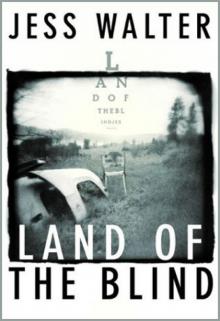 Land of the Blind
Land of the Blind Don't Eat Cat
Don't Eat Cat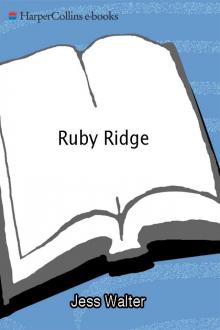 Ruby Ridge: The Truth and Tragedy of the Randy Weaver Family
Ruby Ridge: The Truth and Tragedy of the Randy Weaver Family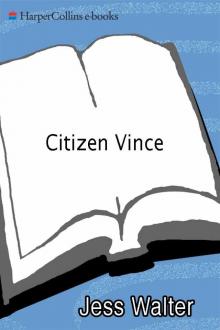 Citizen Vince
Citizen Vince Beautiful Ruins
Beautiful Ruins We Live in Water
We Live in Water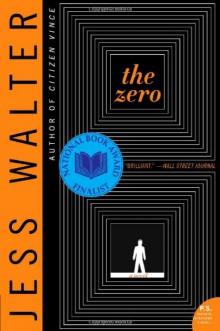 The Zero: A Novel
The Zero: A Novel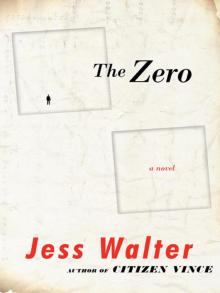 The Zero
The Zero The Cold Millions
The Cold Millions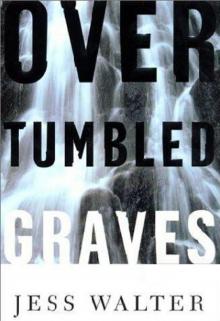 Over Tumbled Graves
Over Tumbled Graves We Live in Water: Stories
We Live in Water: Stories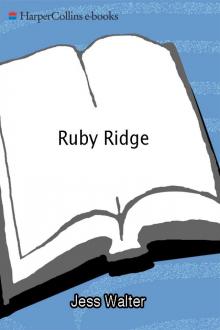 Ruby Ridge
Ruby Ridge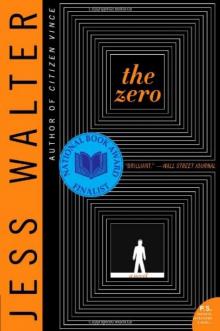 (2006) The Zero
(2006) The Zero (2004) Citizen Vince
(2004) Citizen Vince